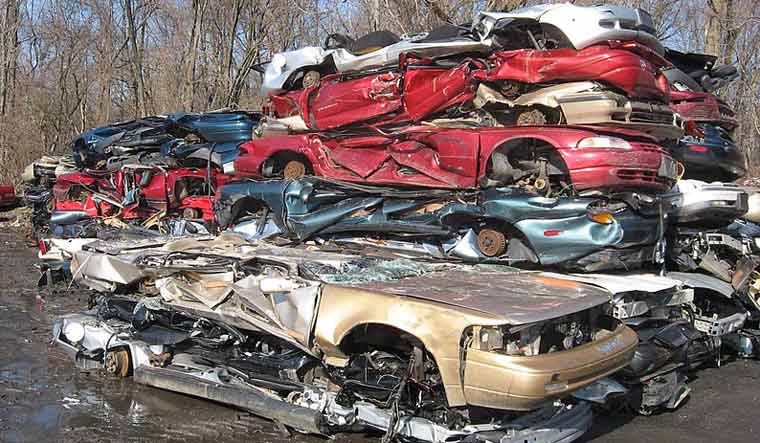The dust-covered tyre-less rusted cars that are seen parked in many places may finally find takers, and the owners could even get a fair price for what has become junk that is hard to get rid of.
The much-awaited vehicle scrappage policy, which has been in the public domain for about a month, has received a cautious welcome from the automobile industry. The government will, however, have to cross many hurdles before implementing it.
The matter of vehicle scrapping is at the heart of the National Scrap Policy that is now in the public domain. It looks at scrap-based steel making technologies as one of the “important options to reduce Green House Gas emission intensity”, besides contributing to the principles of reduce, reuse, recycle, recover, redesign and re-manufacture in the interest of sustainability and environment.
A vehicle scrappage policy, along with the setting up of scrapping centres across the country, could be the panacea that the ailing automobile sector is looking for.
Even before the National Green Tribunal had ordered the scrapping of diesel vehicles that are over 10 years old and non-diesel ones that are over 15 years old in the interest of the air quality in the national capital, the ministry of steel had mooted a proposal to push for a vehicle scrapping policy for different reasons.
The demand of steel scrap has increased considerably in the past globally from 367 mt in 2000 to 589 mt in 2017.
Most of the major steel producing countries like Japan, USA, and China are continuously increasing scrap-based steel production with proportionate reduction from primary route.
While the steel ministry believes that scrap steel is high end-steel, ideally suited for use in the making of new automobiles under the 'Make in India' programme, the automobile sector has, on the face of it, welcomed the scrap policy as also the proposal to set up authorised facilities to deal with the scrap. They are, however, awaiting the announcement of incentives to the automobile manufacturers, who are expected to buy back old vehicles at prices that will tempt vehicle owners to go in for new, and environmentally sound cars that come with the state of the art emission technology.
The automobile manufacturers will add the cost of buying back old vehicles into the new vehicles, thus pushing up the price at a time when there is a stark slowdown. This, according to the Society of Indian Automobile Manufacturers, makes the announcement of incentives, crucial. In a press release, the society said the policy will lead to organised vehicle scrapping facilities and an increase in the demand for end-of-life vehicles available for scrapping.



